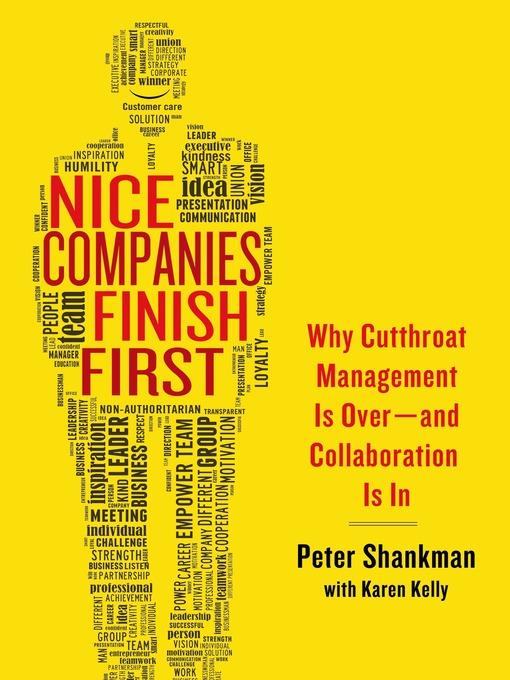
Nice Companies Finish First
Why Cutthroat Management Is Over—and Collaboration Is In
کتاب های مرتبط
- اطلاعات
- نقد و بررسی
- دیدگاه کاربران
نقد و بررسی

December 17, 2012
A University of Florida survey of 700 employees in a wide range of industries found that 31% of participants “reported that their supervisor gave them the “silent treatment during the year.” Surprising? Yes. Ubiquitous? Stunningly so. Strategically successful? Not anymore, says marketing and strategy consultant Shankman (Can We Do That?!), who suggests that the qualities of a good leader are obvious and strategically advantageous, but elusive in today’s business culture. Though Shankman’s insights aren’t groundbreaking, they are well-organized, concise, and convincing. His framework consists of 10 leadership traits that range from the most personal (good listening) to the highest-level corporate strategy (beating the competition through innovation). Some tried and true examples include Wal-Mart’s forays into organic food, Zappos’s focus on customer service, and, on the negative side, Kodak’s myopia and the legendary failure of leadership that resulted in the Challenger space shuttle disaster. Yet he also finds unusual examples, including Neapolitan Pizza’s commitment to charitable cycling events, and the San Diego firm SDA Security’s culture of innovation, communication, and trust. The book’s anti-Machiavellian approach is trendy and humanistic, and it bears repeating by thought leaders. Agent: Carol Mann, Carol Mann Agency.

February 1, 2013
A corporate consultant argues that kinder, gentler corporate leaders and corporations are winning out over older, tougher images of take-no-prisoners leadership. Shankman (Can We Do That?!: Outrageous PR Stunts that Work--and Why Your Company Needs Them, 2006) associates the older view of the ineffective leader with what he calls "A Hopeless Jerk" and offers nine "warning signs" of such a leader, including "Uninterested in Feedback," "Takes Sides Unfairly and Openly" and "Wants a Castle in the Sky." As a replacement, the author provides nine traits for more effective leadership, including the "The Accessibility Factor," "Strategic Listening" and "360 Loyalty." The author buttresses these traits with case studies drawn from the corporate world. The uniting theme is Adam Smith's view of human functioning as "enlightened self-interest." Shankman contrasts some failed top dogs with others who now represent success. Al "Chainsaw" Dunlap, the former CEO of Sunbeam, was an example of the former. His reputation rested on a "gleeful appetite for job cuts," and he eventually flamed out and drove the company into the ground. Another example is Wolfgang Schmitt of Rubbermaid, who refused to consider the views of others. On the positive side is Chris McCormick of L.L. Bean, a company famous for its service and "treating customers like human beings." PJ Bain, of PrimeRevenue, a supplier of digital factoring services to international corporations, stands for the development of skills and abilities of his employees through special training programs and other activities. A smoothly put together business leadership primer that could use further, deeper elaboration.
COPYRIGHT(2013) Kirkus Reviews, ALL RIGHTS RESERVED.

February 1, 2013
Shankman, serial entrepreneur, and coauthor Kelly maintain that if you look under the hood of successful companies, you'll find that they are made up of people working together in an atmosphere that is conducive to civility and good cheer. Assuring us that nice companies are highly profitable and niceness doesn't mean being taken advantage of, we learn nice CEOs and managers are the best leaders. With the benefit of extensive interviews, Shankman and Kelly identify nine nice characteristics, which are enlightened self-interest (transactional benefits of what you do each day); the accessibility factor; strategic listening; good stewardship (good corporate citizens); loyalty (to what works for the whole company and for all good employees); optimism (correlation between positive emotions and positive outcomes); customer service-centric; merit-based competitor (which constantly improves its business); and caring about the business and the people who are part of it and are impacted by it. Shankman and Kelly conclude with rules, including separating oneself from the pack and paying attention. A thought-provoking book for a new generation of leaders.(Reprinted with permission of Booklist, copyright 2013, American Library Association.)

























دیدگاه کاربران